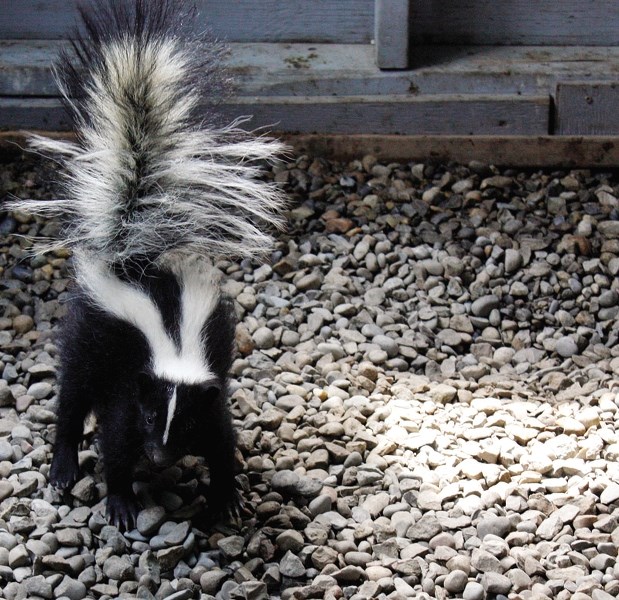As spring approaches, furry critters begin to stir and poke their heads out of hibernation — tummies rumbling and anxious to begin the mating season as they wipe the sleep out of their eyes.
Skunks are one of these critters. And the pack hibernating mammals are coming out of their dens and fixing to forage for food…and mates.
Nearby wildlife rescue and rehabilitation facility, the Alberta Institute for Wildlife Conservation (AIWC), issued a press release last week to spread awareness on how people should conduct themselves, should they come across a black and white-striped creature known for their stink bomb capabilities.
“It’s mating season for a variety of animals, including striped skunks, in Alberta,” said Holly Duvall, executive director for AIWC.
“At this time of the year, skunks are more visible than normal as they look for mates. It’s common for their smell to be more noticeable as males competing for females and territory may spray one another and females that do not want to mate will spray males.”
While not recognized as a major problem in Cochrane, skunks are certainly not the most loved of all wildlife — namely due to their ability to release a highly offensive spray to ward off predators, including humans. The best way to keep skunks out of your yard is to seal off any attractants — including compost bins and garbage, as well as to avoid leaving pet food outdoors.
Brendan Cox, spokesperson for Alberta Fish and Wildlife, advised that if people find skunks to be a pest problem they could also contact their office for advice; the local office can be reached at 403-932-2388.
Cox said skunks often like to hole up wherever they can. These often unwanted roommates are best removed by ensuring there is nowhere for them to take up shelter — including clearing out brush piles; ensuring sheds, porches, decks and any crawl spaces are sealed up; placing mothballs in existing hiding spaces to deter them; and ensuring possible attractants are at least a metre high (as skunks are not good climbers).
Cox said above all, don’t aggravate skunks. While not a typically aggressive creature, they will spray if they feel threatened — so cornering them or scaring them may result in the skunk releasing their precious supply of foul-smelling spray on you.
“To avoid being sprayed, the most effective thing would be to leave the area and to leave the skunk alone,” said Duvall. “Skunks will give warning signs prior to spraying, including stomping their feet, hissing and raising their tails…”
Duvall added that skunks are reluctant to spray — their most powerful defence mechanism, which is strong enough to ward off large predators such as bears — as it takes around 10 days to replenish their supply, leaving them vulnerable.
According to the AIWC, skunks are very important to the ecosystem, as they feed on pests such as insects, mice, snakes (they are immune to snake venom) and ground squirrels. As long as housing spaces and attractants are locked up, Duvall said people don’t need to fear a skunk venturing into their yards and that co-existence is ideal as ‘trapping and relocating animals is often a death sentence’.
“Skunks are great to have in your backyard,” said Duvall. “Not only are they great to watch, but they also feed on a large number of garden and agricultural pests.”
While skunks have poor eyesight, they have excellent hearing and a sense of smell.
Because skunks don’t create damage in public areas as beavers do, they are not normally a critter the town of Cochrane mitigates.
According to Gerry Murphy, manager of parks and open spaces for the town, calls are usually redirected to Alberta Fish and Wildlife; if skunks become a problem, contacting a pest control company may be an option.
Ron Hanson started Eagle Creek Wildlife Control over 20 years ago, following 30 years of service as a Fish and Wildlife officer.
Servicing Calgary and surrounding areas, Hanson said his company does live trapping and relocation of skunks to remote areas, away from farms and rural residences; their Airdrie office can be reached at 403-980-1508.
To reach AIWC or learn more about their upcoming events, including their third annual ‘Bunnies for Bunnies’ Easter fundraiser — supporting injured and orphaned wildlife through sale proceeds of Purdy’s chocolates — visit aiwc.ca.
Purdy’s can be ordered at purdysgpp.com under group number 27575 (25 per cent of all proceeds go toward AIWC).




